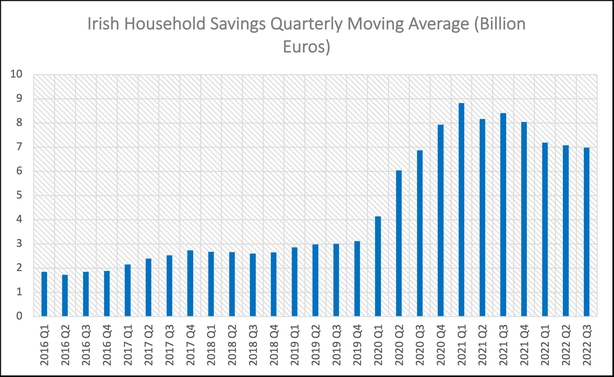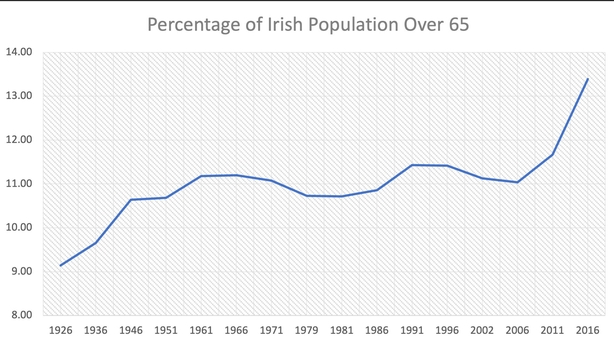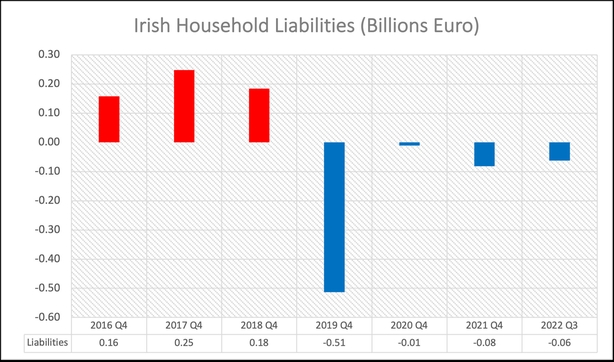Analysis: Irish households are saving a lot more cash than used to be case so is this a good or bad thing for the economy?
While the pandemic had massive humanitarian ramifications, it also influenced economic behaviour. We can still see a legacy of the pandemic today in the saving habits of Irish households, who are saving a lot more than they used to prior to the pandemic.
We need your consent to load this rte-player contentWe use rte-player to manage extra content that can set cookies on your device and collect data about your activity. Please review their details and accept them to load the content.Manage Preferences
From RTÉ Radio 1's Today with Claire Byrne, financial expert Eoin McGee on the best way to make the most of your savings
During Covid-19, household savings rates were incredibly high. By the end of the first quarter of 2021, Irish household savings maxed out at just under €9 billion. Obviously, the restrictions in place then had a lot to do with this. Closing off major sections of the economy restricted what households could spend their money on and large amounts of savings were accrued as a result.
While it's interesting to see the radical effect the pandemic has had on Irish saving patterns, there is a major question we should be asking: why are we still saving so much? Yes, Covid played a part initially, but the pandemic has now gone and we still have significantly larger savings rates compared to pre-pandemic levels. At the end of the third quarter in 2022, Irish household savings amounted to just under €7 billion. To put that into context, Irish household savings stood at just over €3 billion at the end of the third quarter in 2019. So, why is there a difference of nearly €4 billion between those three years?

There are three main reasons to explain why Irish households appear to be saving more.
Ireland's ageing population
French sociologist and philosopher Auguste Comte once said that 'demography is destiny’, meaning that the shape of the population ends up shaping the population’s future. Older people tend to save more money than younger people. This is largely attributed to older people having already engaged in the major investments people take on in their life.
For example, most people’s biggest investment in life will be their house. People work their entire lives to pay their mortgage and by retirement age they generally have it paid off. This means older people are more likely to accumulate savings because they probably have less debt. Additionally, they are also less likely to use their savings to invest in things which may have long term pay-outs.

As can be seen in the graph, Ireland’s ageing population has been growing upward consistently since 1926. Furthermore, more recent figures indicate that Ireland had 139,100 more people aged 65 and over in April 2022 compared to 2016. Having an older population could be one major contributing cause to the increased levels of household savings.
The Celtic Tiger legacy
Some people went a bit mad during the Celtic Tiger period. There were major increases in the number of home owners, second home owners, holiday home owners and landlords. This was facilitated by how easy it was to get money on credit for loans and mortgages. In some cases people were even provided with 100% mortgages.
But while this enabled people to accumulate more assets, it also increased their debts. When the financial crash happened in 2008 and the banks wanted their money back, this led to a period of deleveraging as people and businesses desperately tried to reduce the enormous debt they had accumulated in the Celtic Tiger period. As a result, Irish households used their money to reduce liabilities rather than accumulate savings.

The continuing consistency of household savings suggests that the cohort of the population that were badly affected by this period may have become more cautious. In turn, they also may be cautioning the younger generation which didn't experience it. Correspondingly, this could be facilitating a savings culture rather than an investment culture. The phrase 'once bitten, twice shy’ comes to mind.
Cost of living and housing crisis
The fact that Irish households are saving more now than they did before could just be down to the cost of living and housing crisis. The last year or so has seen large increases in inflation which have made everything households need more expensive.
There is also a great desire among the younger cohort of the population to acquire the resources their parents had. Prior to the pandemic, half of Ireland's young adults (25 to 29 years of age) were living at home with their parents. The equivalent figure in the UK was just under a quarter. Large savings rates could be a result of Irish households simply not having the money required to buy what they want.
We need your consent to load this rte-player contentWe use rte-player to manage extra content that can set cookies on your device and collect data about your activity. Please review their details and accept them to load the content.Manage Preferences
From RTÉ Radio 1's Today With Claire Byrne, how much did people save in the pandemic?
So, is the increased savings a bad thing? Well there’s a few elements to this question. If the reason for more savings in Irish households is that inflation is making everything too expensive, this is not good. In general we should strive for people to be able to afford what they need. This satisfies the demands of consumers and provides firms with revenue to pay their staff.
That said, the only way to curb inflation is to reduce the money supply and the number of transactions occurring within the economy. While people not being able to spend because of high prices is a bad thing, a cooling down of the economy will help with inflation in the long run and make goods and services less expensive. But like most treatments, needing to save instead of being able to spend is still a bitter pill to swallow.
The views expressed here are those of the author and do not represent or reflect the views of RTÉ








